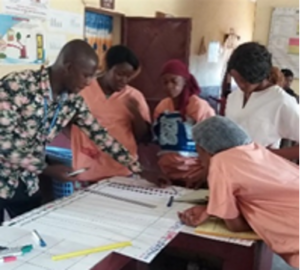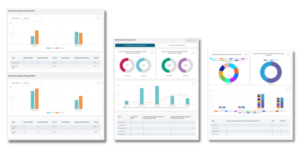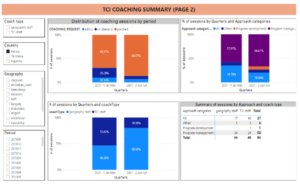During the COVID-19 pandemic, many global health programs experienced delays and setbacks in collecting data; however, we know that data can only be used to inform programs if properly collected and analyzed in a timely manner. In three Jhpiego-supported countries implementing family planning programs—Indonesia, Guinea and Kenya—the creation of data dashboards enabled the teams to analyze data in real time, visualize problem areas and quickly offer solutions to improve postpartum family planning services.

Postpartum family planning services are a set of proven integrated interventions for preventing unintended pregnancies in the postpartum period—the six weeks following childbirth. The provision of high-quality family planning services for postpartum women is recognized by the U.S. Agency for International Development as a family planning high-impact practice. Jhpiego, a leader in programming for postpartum family planning in these three countries and others across Africa and Asia, is working to improve access to facility-based postpartum family planning services.
In Indonesia, a significant decrease in uptake of postpartum family planning was noted in Bogor district and in Ciawi Public Hospital, two areas where Jhpiego provides support. In Guinea’s Kindia region, health centers noted poor maternal health and family planning service data during various monthly data reviews. And in Kenya, problems with inconsistency and low reporting were noted in the many different reporting systems.
In these three focus countries, virtual dashboards were developed to ensure proper collection and timely analysis of data for use in identifying bottlenecks or problems and in determining corrective action.

By analyzing the new postpartum family planning dashboards each month, Jhpiego’s team in Indonesia was able to evaluate trends and produce detailed insights related to services at the health facility level. Parsing through the data with the Ciawi Public Hospital quality improvement team, they saw several reasons why services had decreased. First, it became clear that most postpartum family planning services were not being delivered on holidays and at night. Second, even though several patients had chosen to use family planning, trained health providers who could provide the services were not on duty; and the midwives who were on duty had not received training to provide the required services. In response, the team suggested that all midwives in the hospital be required to be trained on postpartum family planning counselling and postpartum intrauterine devices and implant insertion.
These data-driven actions have already shown an impact on service uptake in Ciawi Public Hospital. For example, the hospital organized in-house trainings, routine drills and on-the-job trainings. Subsequently, the number of women who received a family planning method of their choice prior to discharge increased from 27 percent in July 2021 to 68 percent in August 2021 and then 73 percent in September 2021.
In the health centers of Guinea’s Kindia region, dashboards stimulated discussions about the data and possible causes of poor results. Staff then proposed and implemented corrective measures. As these corrective measures improved postpartum family planning uptake, the dashboards reflected the improvements and motivated teams even further. At the Bibane Urban Health Center, for example, the number of new family planning users increased threefold between January–March 2020 and January–March 2021. This increase continued, and by July–September 2021 had risen fivefold.

In Kenya, The Challenge Initiative uses the dashboard to monitor, triangulate and visualize family planning project performance. The dashboard brings together data from various sources, such as the health management information system and project data collected through the Open Data Kit app and the Performance Monitoring and Action program. The dashboards provide a platform for monthly data verification to rectify any identified data errors and for making decisions on performance. Both the project and Ministry of Health staff can easily access the dashboards, which facilitate integration and data use during regular performance reviews and management team meetings. Action plans are then developed to address any poor performance areas and to conduct data quality activities. The Challenge Initiative’s reporting rates have improved and are currently above 95%. There has also been significant improvement in the quality of the data submitted as a result of continuous monitoring and review by the project’s implementation teams.
Dashboards are a key tool in Jhpiego programs’ strategies to engage health workers, health facilities, district and regional managers and data managers in making informed, data-driven decisions and taking corrective actions. In so doing, Jhpiego continues to catalyze improvements in consistent, equitable and voluntary postpartum family planning services for all women who access the health system.
Kirole Ruto is a monitoring, evaluation and learning and data manager in Kenya. Jacqueline Aribot is a monitoring and evaluation director in Guinea. Siti Fatimah is a field officer in Indonesia.



